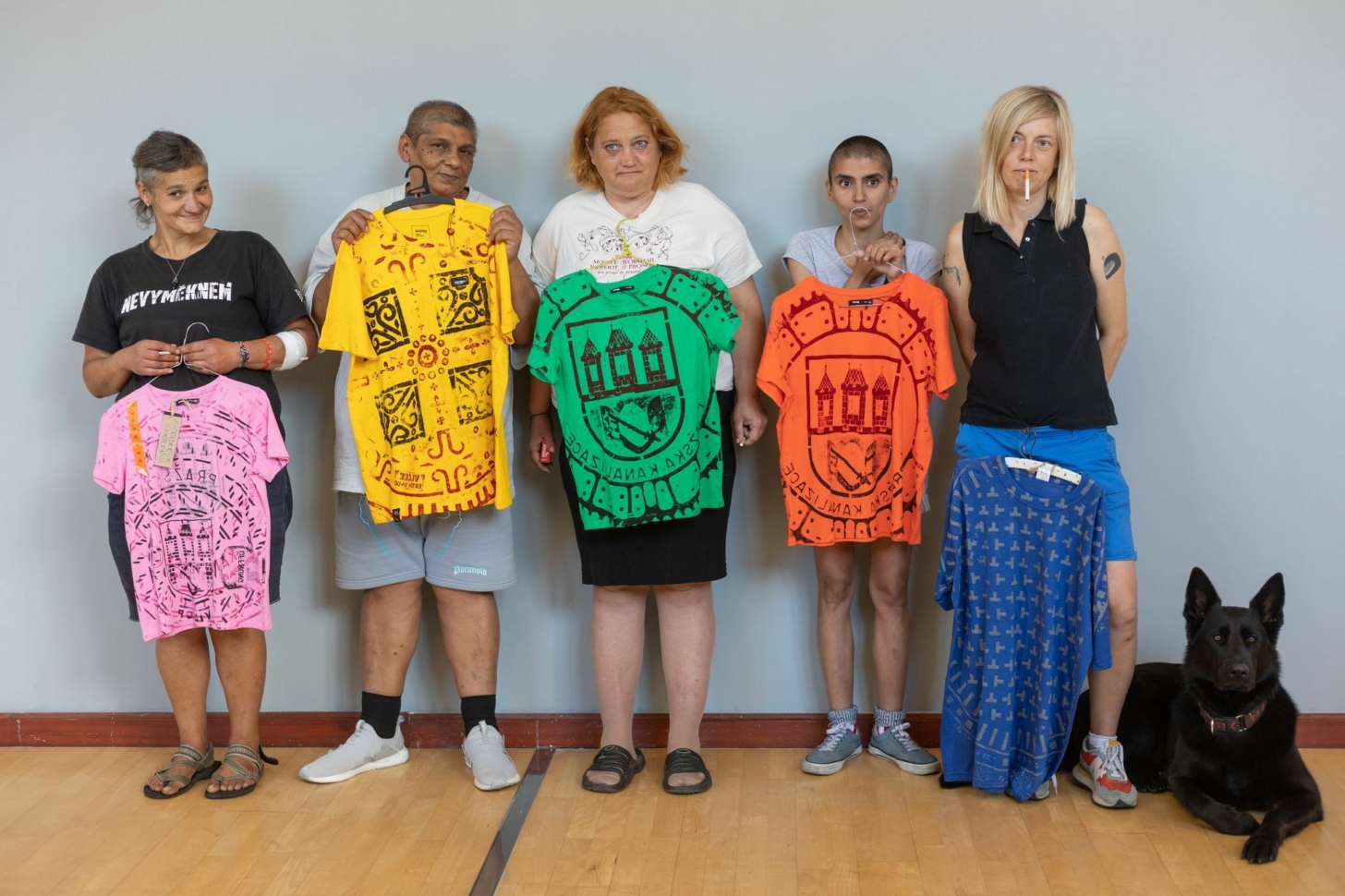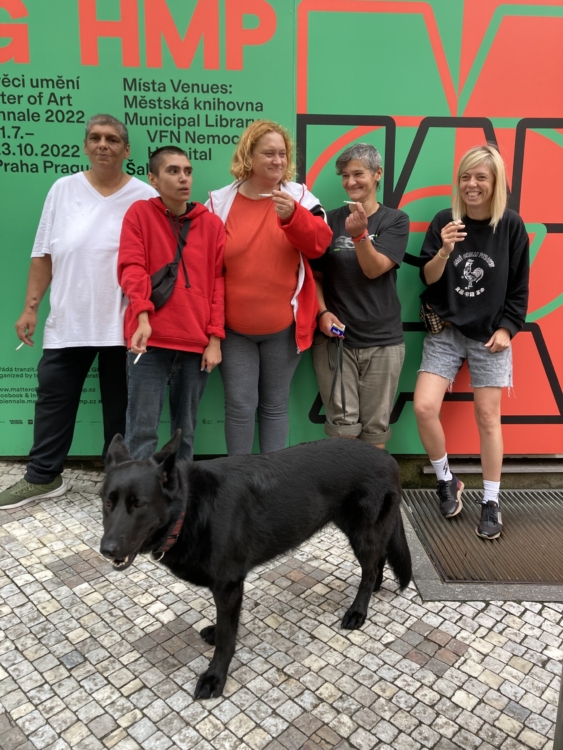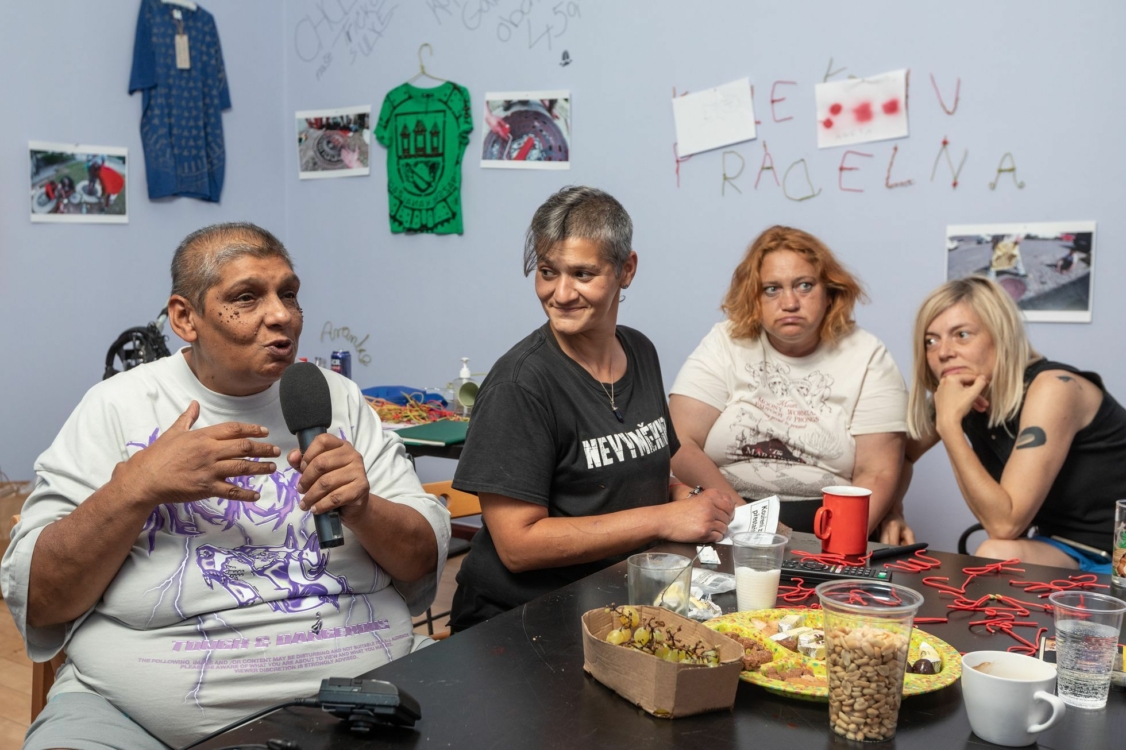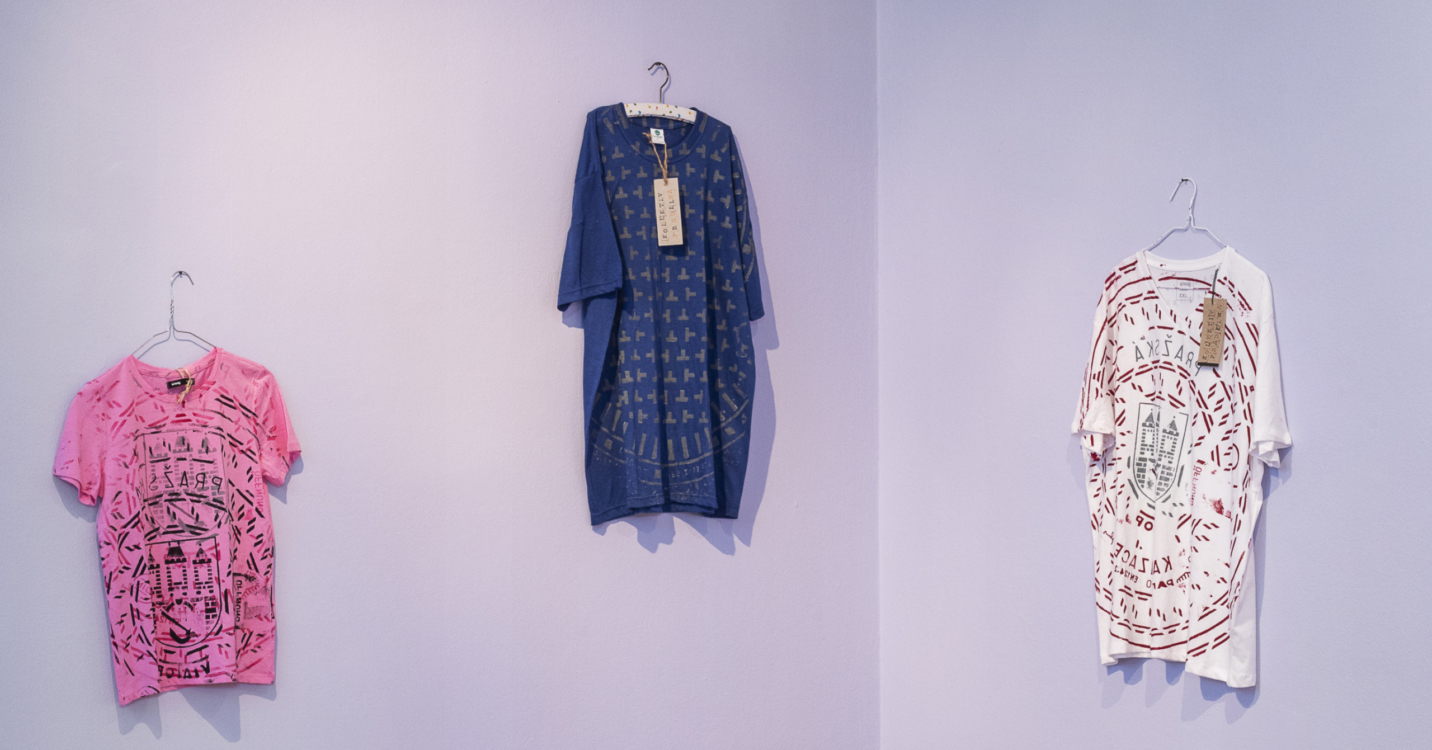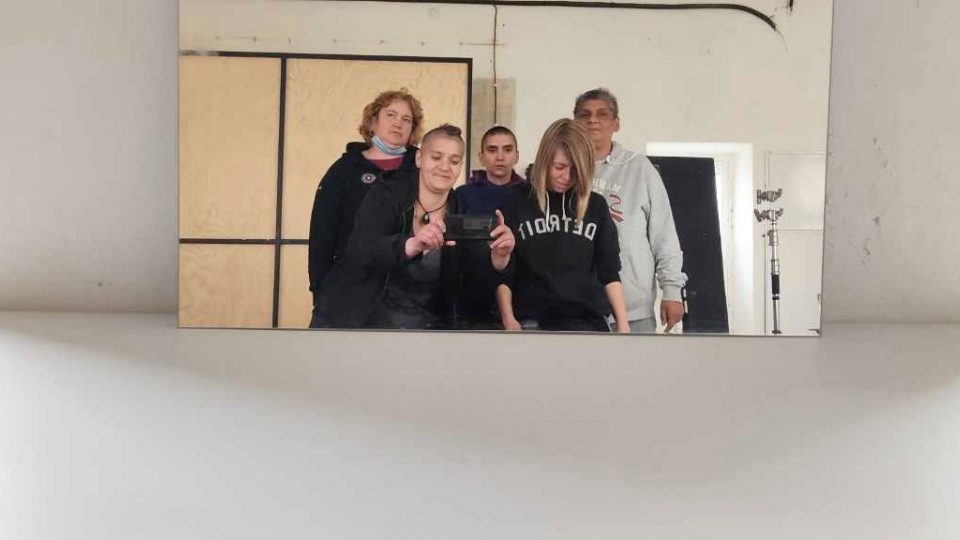Prádelna Collective: Everyone has the right to go to a gallery Tereza Butková
This year, the spaces of the GHMP again opened their doors to the Matter of Art biennial whose second edition focuses on the themes of identity, fragility, resilience, and neglected perspectives. Among the artists approached by the curators and the tranzit.cz initiative is the Prádelna (Laundry) Collective. The collective is made up of women with current or past experience of homelessness, which they decided to process for this year’s biennial, bringing street life closer to the art world.
Videos, t-shirt printing, refreshments, a place to relax and explore. The artistic performance of the Prádelna collective is not only to present their own work but also to create a space to meet and overcome the barriers that usually stand between visitors to art institutions and people without a stable home. During the biennial, the regular Tuesday meetings of the collective are therefore moved to the gallery space where Linda, Monika, Balú, Helena and Magda connect the two worlds and create an environment that welcomes everyone without distinction. For the rest of the week, the collective is represented by projected videos whose central theme is the prejudices and stereotypes that divide people from different backgrounds.
“We switched our roles in various ways; at one point, the girls were the artists with a good background, and I was the one getting the money. We tested how artists treat someone coming from the street and, vice versa, how people coming from the street see artists. What stereotypes people have towards those coming from the other side. We also made films about the behaviour of those who walk by, use foul insults, and have the nerve to walk straight up to someone’s face with a camera, filming them without permission,” says the Polish-Czech artist, Magdalena Kwiatkowska, who is the only one of the collective who has a stable home. “We always imagine a person in need as someone who is dependent on others. As if they were not independent and did not have the full legal capacity to act on their own behalf; as if they couldn’t speak for themselves. Which so often is the case
because we don’t allow them to. We devalue them where they are because we don’t give them a voice.”A chance to try art
It was the opportunity to take the initiative and implement their own ideas that was crucial for the members of the collective. As they point out, life on the street does not give much space or time for creative work. The turning point came when Magdalena was awarded a three-month residency at INI Gallery at the turn of 2019 and 2020. Here, she decided to create a space for homeless women and to work together on art installations with the Jako Doma organisation. “Magdalena always brought us a paper with a topic and said: Let’s go, we should say or create something about ourselves on this topic. So, we filmed ourselves, we made up different things. For example, we showed how to wash clothes in the snow in the street in winter,” Linda recalls.
Most of the women included currently in the collective were close to art before. Monika writes poetry, Helena acts in the theatre, and Linda likes to sing and also has some experience of the theatre. However, it was only when their basic needs were secured, and they had the opportunity to devote themselves fully to art that the establishment of the current collective was possible. Although it has been two years since they worked and lived together at INI Gallery and some of its members still lack stable housing, the collective continues to work. The tranzit.cz initiative provides the facilities, a space where the artists discuss their work on a weekly basis. “It’s a process, we don’t know what it will look like at the end. We talk about it together,” is how Balú explains their creative methods. The only limitation is that Magda is the only one with a stable home and, unlike the others, she can also work on projects at home. “Each of us would like to help Magda, but we don’t have the opportunity. I try to help with grammar, Helena speaks four languages and can help with translation. But then we have to go to Magda’s place,” says Monika.Feeling equal
The burden of struggling every day with where to find food and charge your phone, while avoiding conflicts, is a constant theme in the conversation. It might seem that art has no place in such a situation, but the collective is an opportunity for the members to take a break from such existential problems for a short while and feel equal. As Monika adds: “On the street, there’s always someone looking at you and watching you. Here, it’s an escape from reality, at least for a few hours. You don’t feel like a cigarette butt on the ground.”
The Prádelna Collective has long been drawing attention to the feeling of exclusion and inadequacy in public space, which should be, on principle, accessible to all. Monika, Balú, Helena and Linda agree that because of the constant unpleasant staring and judging, they would not even think of going to a museum, gallery or cinema themselves, even if they were interested. “I didn’t even try. I thought to myself , why should I go there if I’m not going to be accepted and they’re going to look at me in a bad way. So, I preferred not to go,” says Helena, and Monika supports what she says: “When Magda and I were at the Vltavská metro station, where the outdoor gallery is, before Prádelna was launched, it was obvious that we belonged to Magda and that’s probably why everyone smiled at us. Once I was further away and it wasn’t obvious, everyone looked at me strangely and disdainfully. And I don’t need that.”
The aim of participating in this year’s biennial is therefore to draw attention to these barriers and to make art institutions more open, perhaps by making practical changes to meet people in need. These start with more accessible texts that are understandable even to people without an artistic background and continue with friendly staff and the possibility of having your phone charged or keeping track of your belongings. “People in need are not as trusting as other visitors when it comes to handing over their bag and trusting that it will stay there, and no one will take it. They may only have newspapers or cups, but they depend on them because it’s their livelihood,” explains Balú. She gives the example of the suspension system on the ceiling of the INI gallery which allows anyone to hang up their backpack and keep an eye on it. “You want to do something to bring it closer to people who don’t have a choice. I’m a little fearful of it being a spectacle in the sense of: The gallery is trying to be accommodating towards the homeless. But we’re people, too. And I think we have a right to have an open door,” points out Monika.A dialogue across groups
Despite ever-present prejudices and obstacles, the members of the collective see some chance for change. As Monika points out, the long-term work of Prádelna and Magdalena’s initiative is helping them to open up new possibilities, even in established institutions, and thus slowly change the attitude of the majority public. But there is still a long way to go before there is equality and openness.”If a gallery wants to change and become more accessible, it has to start with its staff. They need to understand why they are doing it,” Magda reminds us, suggesting, for example, employing people with experience of homelessness who have an understanding of the needs of people in need. She also stresses that everyone’s voice needs to be heard, which includes custodians, cloakroom managers, curators and people in leadership positions. “Continuity is important. It’s about galleries being open to everyone, not just targeting vulnerable people. So everyone can come and spend time there, have a chat.” The whole collective agrees on the need for a common dialogue across different groups and admits that sometimes more patience is needed. But they say it is important to remember that people in need have the same emotions as others, they just get up in the morning with different worries. “I keep thinking about the question of what institutions should do. It’s asked by almost everyone and I understand that. Butshouldn’t you be asking yourself instead of asking us?” asks Monika. “The most important thing, in the end, is to accept the person, whoever they are. And not to be indifferent. That’s a small thing, after all,” she concludes.

